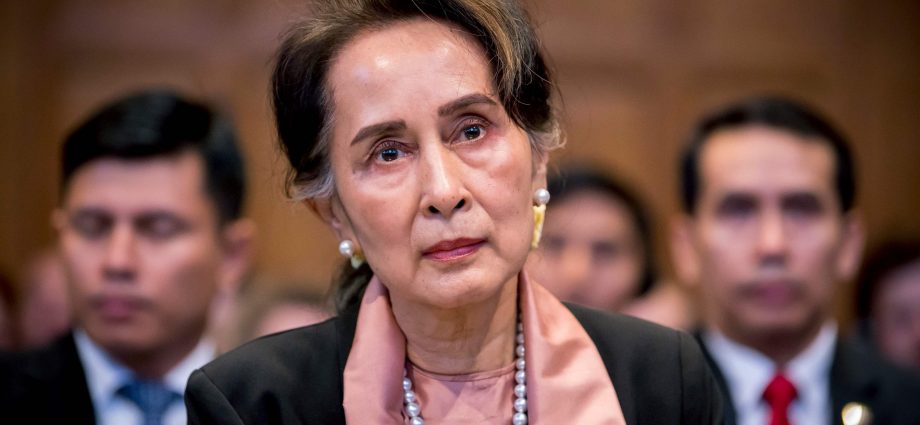The unprecedented Military Coup insurgence in Myanmar has triggered international criticism terming the act as a murder of democracy. U.S President Joe Biden called the military actions “a direct assault on the country’s transition to democracy and the rule of law”. On February 1, the Myanmar coup detained more than 400 lawmakers and sentenced them to house arrest. Confining them into their governmental residence with strict restrictions. Most importantly, country’s de facto leader Aung San Suu Kyi is yet again barred under house arrest after release in 2010.
The Military claims the coup to be necessary as they have proposed to identified fraudulent activity taken place in the last general election in which Suu Kyi’s party National League for Democracy (NLD) won majority in the parliamentary seats. According to the Myanmar Constitution, enacted in 2008 suggests that the Military can take charge of the country anytime under security reasons. Military Commander-in-Chief Min Aung Hlaing is given the authority and power to rule the country until further decisions. Aung Hlaing is serving the Myanmar Military for the past 11 years and extended the tenure despite crossing the verge limit of retirement.
In Myanmar, the general election took place on November 2020, wherein Suu Kyi’s Democratic Party withheld to power again following a landslide victory that was marked in 2015. However, the military claims that the de-facto leader’s party has materialised the election with illegitimate activists. The unexpected dominance of the military coup in Myanmar has also staged protest rally in front of the United Nations University in Tokyo. The Parliament House of Myanmar holds 75 percent seat to democratic party and rest 25 percent is under control of Military.
Democratic fight of Aung San Suu Kyi:
Suu Kyi, also known as a non-violence preacher of democracy has fought more than four decades to sustain democratic rights in Myanmar. After 50 years of Military exercise, Suu Kyi’s NLA became the mouthpiece of the people of Myanmar. Aung San Suu Kyi is the daughter of Aung San Suu who was the then Military General of Burma (Myanmar) and the person responsible to negotiate Burma’s independence in 1941 from British after Burma’s separation from India in 1937.
After her father’s assassination in 1947, Suu Kyi moved to India and completed her higher studies. Later Suu Kyi relocated to Britain and continued her livelihood until was forced to return to Burma for her ailing mother. On her return to Burma, Suu Kyi experienced the need of democracy in the country. Aung San Suu Kyi emphasised her stance on democracy and initiated a non-violence leadership. In 1989, Suu Kyi was sentenced to six years of house arrest and was debarred from participating in any political election. But, her movement for democratic rise in Myanmar didn’t ended. The people of Myanmar stood beside Suu Kyi and propagate her re-formative ideas. In 1990 Suu Kyi was awarded the Nobel Peace prize for her consistent struggle to transform Myanmar a democratic nation.
The contingency of Military administration in Myanmar was challenged by Suu Kyi emerging popularity at international domain. Unfortunately, this didn’t went well with the ruling Military and Suu Kyi was again arrested in 2003, following a attack that killed four security personnel. The de-facto leader Suu Kyi in 2015 general election made a landslide victory and created a historic revamp in Myanmar.
Although, winning the election, Suu Kyi was scrapped from holding Presidential chair. In regard to Myanmar constitution that was developed by the Military noted anyone’s children who own alliance to foreign power cannot become president. As Suu Kyi two sons are British, she was forbidden to hold the position.
It was adhered that despite being a strong activist of democracy, Suu Kyi miserably failed to administer some of the volatile insurgencies in the country. Suu Kyi relentlessly denied the barbaric genocide of Rohingya’s Muslims and arrest of Reuter journalists. The administration activities didn’t peaked well and criticism capsulated her.
India-Myanmar equation:
India shares a border distance of 1,600 km with its neighbouring allie Myanmar. Since the Independence, both of the countries are exponentially supporting each other through bilateral interest. The geographical boundaries between the two countries play a pivotal role in shaping strategic infrastructures, especially for India. India has built a large deep sea port in the Sittwe in Rakhine province that is aimed to accelerate economic activities between Mizoram and Myanmar. Moreover, India is selling military hardware to Myanmar including rocket launchers, radars, motor gun, 105mm artillery gun and more.
The military coup has certainly drawn a pragmatic notion internationally. In case of India, situation might worsen as Beijing shares friendly relation with Myanmar military. The regain of Military dictatorship in Myanmar is asserted to provide a fast-paced work in compliance to China-Myanmar Economic Corridor.
Rituparna Dutta

